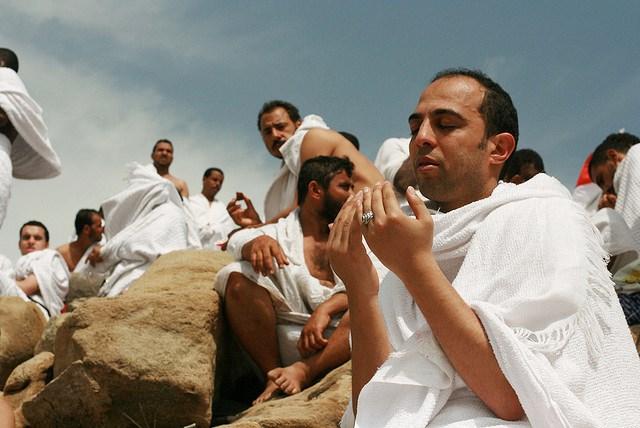The number of MERS-CoV cases in Riyadh's outbreak climbed by 10 today, as Saudi Arabia's Ministry of Health (MOH) made its first statement about a hospital-linked outbreak, which said the facility's emergency department (ED) has been closed to curb the spread of the virus.
The MOH has now confirmed 69 MERS-CoV (Middle East respiratory coronavirus) cases in Riyadh this month.
Looking at another aspect of the MERS threat, the agency also said sacrifices involving camels—thought to be a reservoir for the virus—will be prohibited in connection with Hajj religious rituals later this year.
Two more deaths reported
All 10 of the new cases reported today in the Saudi MOH's regular update involve Saudi citizens from Riyadh, and authorities are probing exposure sources for all of them. Though the MOH doesn't specify if they are linked to an outbreak at the city's King Abdulaziz Medical City, in weighing in on the event a few days ago the facility said several more suspected cases were under evaluation.
One of the patients included on today's list of new cases is a healthcare worker, a 59-year-old woman who is listed in stable condition.
One case, that of a 35-year-old man who had an underlying health condition, proved fatal. The MOH also announced the death of a previously reported patient from Riyadh, a 71-year-old man who also had a preexisting medical condition.
All of the latest lab-confirmed patients are adults, ranging in age from 34 to 87 year old. Two are hospitalized in critical condition, and seven are listed as stable.
According to the MOH, 48 people are still being treated, and three are in home isolation.
Cases reported today boost the country's overall total from MERS-CoV to 1,128 infections, 485 of them fatal. So far 592 people have recovered.
MOH notes hospital outbreak
The country's health ministry yesterday acknowledged the hospital link in the Riyadh outbreak in a statement in Arabic on its Web site, picked up and translated by Avian Flu Diary, an infectious disease news blog.
The MOH said the spread of the virus was relatively limited to one source and that the hospital's ED is closed. It added that authorities are meeting with hospital officials and have plans to be transparent about the outbreak with the public and the media.
The statement said that health minister Khalid Al Falih held a press conference, at which he said more cases are likely to be reported and that the virus could spread to other facilities. With the hospital's ED closed, the current focus is on limiting contacts and isolating suspected and confirmed cases.
MOH advised the public not to worry and added that school closures and activity bans aren't warranted. It added that people should follow basic hygiene procedures and observe precautions when visiting hospitals.
Also, officials said the country had experiences similar outbreaks before, and that strict application of MOH-recommended infection control steps has stemmed them in the past and will be useful in curbing the current outbreak.
Camel restriction
In a separate development reported in the Arabic language media, also translated and posted by Avian Flu Diary, the MOH yesterday announced a ban on sacrificing camels as part of Islamic Hajj rituals this year. The Hajj starts Sep 25 in Saudi Arabia.
As part of the pilgrimage, each person must sacrifice or pay for part of the sacrifice of a sheep, goat, cow, or camel. The cooked meat is then shared with the poor.
Camels are thought to harbor the virus, and health officials suspect that sporadic zoonotic transmission plays a role in fueling MERS-CoV transmission in the Middle East, especially in Saudi Arabia, the hardest-hit country.
Experts monitor developments
Peter Ben Embarek, PhD, who heads the MERS-CoV response for the World Health Organization, spotlighted the ED closure and added that new cases are being reported daily, ones that were detected some time ago.
Earlier this week he said global health officials are in close contact with Saudi Arabia's health officials and that support options were under discussion, including the possibility of a joint mission.
Maria Van Kerkhove, PhD, an epidemiologist with the Pasteur Institute Center for Global Health in Paris, has been part of past joint missions to investigate MERS outbreaks in Saudi Arabia and South Korea. She said the characteristics of nosocomial outbreaks in Saudi Arabia and elsewhere are unfortunately similar. Common factors include overcrowding, poor infection control, and lack of awareness that can amplify transmission in hospital settings, she said.
"Saudi Arabia has the tools and knowledge to tackle and stop nosocomial outbreaks, including this outbreak in Riyadh," Van Kerkhove added.
See also:
Aug 20 Saudi MOH statement
Aug 19 Avian Flu Diary post on Saudi MOH hospital outbreak statement
Aug 20 Avian Flu Diary post on Hajj camel sacrifice ban






















